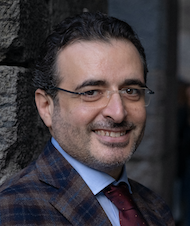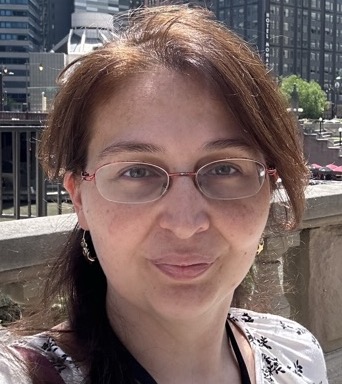
"Quantum artificial intelligence: genesis, state of the art and prospective"
by Giovanni Acampora and Autilia Vitiello
Quantum computing and artificial intelligence are two highly topical fields of research that can benefit from each other's discoveries by opening a completely new scenario in computation, that of quantum artificial intelligence. Indeed, on the one hand, artificial intelligence algorithms can be made computationally more efficient due to the massive parallelism induced by quantum phenomena; on the other hand, the complex development of quantum computing technologies and methodologies can be properly supported by the use of classical artificial intelligence approaches.
This tutorial will allow auditors without particular knowledge in quantum computing to acquire information about the meaning of the term quantum artificial intelligence, the main approaches developed in this field of research, the tools used to implement quantum algorithms and, finally, the challenges that need to be addressed in order to consolidate this field of research.
The tutorial will be organized in three main parts. The first part will be devoted to introducing the quantum artificial intelligence research area including basic concepts of quantum computing. Quantum artificial intelligence involves the combination of quantum computing and artificial intelligence in two directions. The first one considers the use of quantum computing to enhance artificial intelligence techniques such as evolutionary algorithms. For this reason, the second part of the tutorial will discuss the implementation of a genetic algorithm on a quantum computer. The second direction of the hybridization between quantum computing and artificial intelligence is the exploitation of artificial intelligence techniques such as neural networks or fuzzy logic for addressing quantum computing issues. For this reason, in the third and last part of the tutorial, a fuzzy clustering-based approach is discussed for addressing issues related to noise of the current quantum devices. Hereafter, the point-form outline of the tutorial:
Part 1: Introduction to Quantum Artificial Intelligence
1. Introduction to quantum computing (15 minutes).
2. Genesis of quantum artificial intelligence (10 minutes)
3. State of the art of quantum artificial intelligence (15 minutes)
4. Prospective of the quantum artificial intelligence (10 minutes)
Part 2: Implementing a genetic algorithm on a quantum computer
1. Introduction to HQGA (15 minutes)
2. Using Python notebooks to run the algorithm on quantum computers (5 minutes)
Part 3: Implementing a fuzzy clustering-based approach for quantum error mitigation
1. Description of the application of fuzzy clustering to quantum error mitigation (15 minutes)
2. Using Python notebooks to run the algorithm for quantum computers (5 minutes)
Speakers

Giovanni Acampora
Giovanni Acampora received the M.Sc. (cum laude) and Ph.D. degrees in computer science from the University of Salerno, Fisciano, Italy, in 2003 and 2007, respectively. He is currently a Professor in artificial intelligence and quantum computing with the Department of Physics "Ettore Pancini", University of Naples Federico II, Naples, Italy. From September 2013 to June 2016, he was a Reader in computational intelligence with the School of Science and Technology, Nottingham Trent University, Nottingham, U.K. From July 2012 to August 2013, he was in a Hoofddocent Tenure Track in Process Intelligence with the School of Industrial Engineering, Information Systems, Eindhoven University of Technology, Eindhoven, The Netherlands. His main research interests include computational intelligence and quantum computing. Prof. Acampora is the Chair of IEEE-SA 1855WG, Founder and Editor-in-Chief of Springer Quantum Machine Intelligence, Associate Editor for Springer Soft Computing, and an Editorial Board member of several international journals. In 2017, he acted as the General Chair of the IEEE International Conference on Fuzzy Systems. He was the recipient of three prestigious awards, the IEEE-SA Emerging Technology Award in 2016, 2019 Canada-Italy Innovation Award for Emerging Technologies, and IBM Quantum Experience Academic Research Program Award, two best paper awards, the first one at the United Kingdom Workshop on Computational Intelligence, UKCI 2012 (Edinburgh, Scotland, U.K.), and the second one at the 2021 IEEE International Conference on Fuzzy Systems (FUZZ-IEEE 2021), and IEEE Computer Society Emerging Technology Grant to initiate the creation of a new research network in the field of quantum artificial intelligence in 2022.

Autilia Vitiello
Autilia Vitiello received the M.Sc. (cum laude) and Ph.D. degrees in computer science from the University of Salerno, Fisciano, Italy, in 2009 and 2013, respectively. Since July 2022, she has been a Tenure Track Associate Professor with the Department of Physics "Ettore Pancini", University of Naples Federico II, Naples, Italy, where, from December 2018 to July 2022, she was an Assistant Professor. Her research interests include computational intelligence and its integration with quantum computing. Dr. Vitiello is the Chair of the IEEE-SA P2976 Working Group (WG), and she acts as a Secretary for the IEEE-SA 1855 WG. She is an Editorial Board member of Springer Quantum Machine Intelligence. She was the recipient of the Best Paper Award at the United Kingdom Workshop on Computational Intelligence, UKCI 2012 (Edinburgh, Scotland, U.K.), of the Best Paper Award at the 2021 IEEE International Conference on Fuzzy Systems, IBM Quantum Experience Academic Research Program Award, and IEEE Computer Society Emerging Technology Grant to initiate the creation of a new research network in the field of quantum artificial intelligence in 2022.
Conventionality in research belongs to yesterday!
The QUASAR Lab is part of the Department of Physics "Ettore Pancini" of University of Naples Federico II,
where it is committed to perform research activities in theory and applications of
Computational Intelligence, Quantum Machine Intelligence and Cognitive Robotics.
